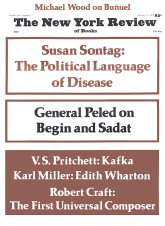In response to:
Reflections on Political Scandal from the December 8, 1977 issue
To the Editors:
“Obscure” is a dangerous word of belittlement, even from the talented pen of Renata Adler.
Is it right to disparage a winner of the Congressional Medal of Honor and four-term congressman by calling him an “obscure” fanatic? Miss Adler thus refers to Richmond Hobson, whom I remember from my childhood as a naval hero of the Spanish-American War.
“Fanatic” Hobson may have been. I shall not judge that, but I can say that the word “obscure” is used too lightly as a term of disdain by too many writers while they are enjoying their own passage under the limelights. Those of us who have lived through more American history have a wider view of the lights that dispel obscurity.
Perhaps most of the readers of Miss Adler’s review of Epstein’s Agency of Fear don’t care about the casual reference to Hobson, but I checked the facts in Webster’s Biographical Dictionary, 1943.
Murat W. Williams
Madison Mills, Virginia
Renata Adler replies:
I am glad that Mr. Weiss agrees with my general point about naming sources. He is mistaken, however, in his belief that my footnote to the Atlantic article was made necessary by an absolute lack of other authority or confirming developments. Within a week of the article’s appearance, the Sunday Washington Star carried a piece by its staff writer, Jeremiah O’Leary—recently identified, in an article by Carl Bernstein, as a valued CIA asset, but more commonly known among civil rights reporters, in the unpleasant episode of the Dr. King tapes, as the reporter most friendly to the FBI. In any event, with the five column headline “Haig Probe: Did Nixon Get Cash from Asia,” the article reported that, two months before Nixon’s resignation, no less a figure than Alexander Haig, having reason to suspect that John Caulfield and Tony Ulasewicz had gone to Vietnam to pick up money, ordered “a secret investigation of any Nixon connections with huge cash contributions from countries in the Far East.” I don’t know what Mr. Weiss would make of an article from such a source quoting such a source about such a source; but in view of his interest I draw his attention to it. The reason I cited my own article was not that it was the sole source for my underlying statement—but that it was the most tentative, and it was the first.
I am sorry to have maligned Captain Hobson. It is a matter of words. By a well-known fanatic, I would mean, say, Carrie Nation or Cotton Mather. The standard is too high. My point is only that he was a figure of no importance in the history of this country’s antinarcotics laws.
This Issue
February 23, 1978



